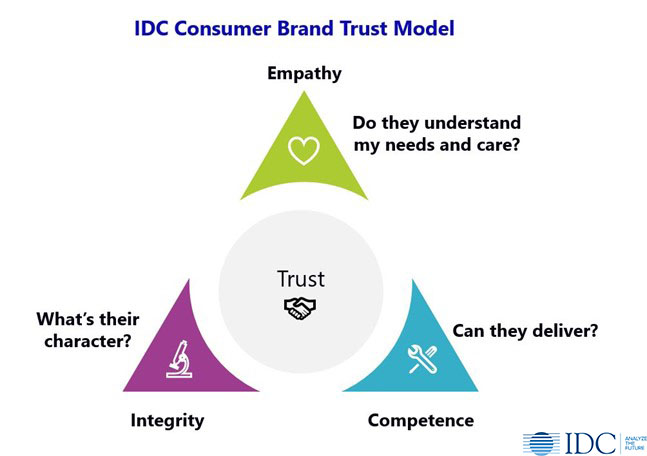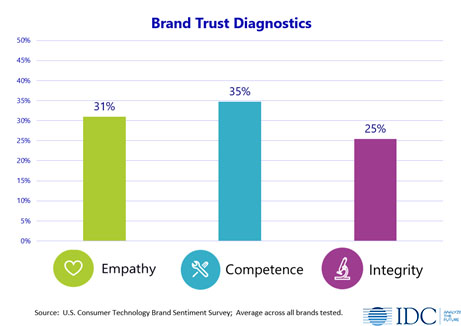COVID-19 drove significant consumer digital transformation and accelerated the already prominent shift of advertising dollars from traditional media to digital. For the first time in 2020, Google, Facebook, and Amazon accounted for half of all advertising revenue.
With more time spent online, consumers are increasingly aware of the fact that companies are using their data and are concerned.
Learn the implications for your company and why you should embrace this opportunity to protect consumers’ data and privacy, build trust, and differentiate your company from others.
The Changing Online Advertising & Privacy Landscape
Much has been in the news recently about changes to Apple’s policy regarding its Identifier for Advertisers (IDFA). Among other things, until now, advertisers have been able to use the IDFA to target individuals based on the apps they are using without having to get their consent. The default option has been for the sharing of this information.
All of this is set to change when Apple introduces iOS 14 later this year. Users will be given a choice. This is expected to result in a significant percentage of opt-outs.
This irked Facebook and others who rely heavily on the IDFA to drive targeted ads. Then, last week, the Chinese Advertising Association announced development of an alternative identifier known as the CAID, which would serve a similar purpose as the IDFA, in a deliberate initiative to bypass Apple’s new requirement. It has also led to conjecture regarding Apple’s commitment to enforce the policy, given the issues it could cause with the Chinese government.
Google has announced the planned elimination of the use of third-party cookies, although some question the real impact of this, given the fact that they have so much direct consumer data.
At times, companies seem more concerned about plausible deniability than truly concerned about protecting consumers’ data. More than one tech company has been heard to say, “We did not authorize this use of consumer data.” This, of course, is different than saying, “we were not aware that the consumer data we collect was being used or how it was being used by other companies.”
A Double Standard Exists – Where is the Revolt Against Other Companies?
It’s not just the big tech companies who push the boundaries of what’s acceptable on privacy. Have you ever read what banks and other financial institutions’ privacy policies say? If you do, almost every time, you will note that there are some elements of sharing of your data for which you are not permitted to opt out.
What Do Consumers Think about All of This?
Late last year, I did a series of video interviews to understand consumers’ opinions on a wide range of topics, including the topic of privacy online and advertising. One college-aged woman put it this way.
“They don’t necessarily lie when they say that they’re only using it to personalize ads. But they still have access to a lot of data that personalizes it. One can only wonder what kind of stuff they could do with it…A personalized ad isn’t really worth compromising that much data on yourself.”
A Personal Example
Recently, I was cutting down an overgrown tree in my front yard with a chainsaw. The chain came loose and I wanted to see a video of the best way to reinstall it.
To understand my experience, it’s important to point out that I had moved recently and had just bought a hedge trimmer, making me a prospect for many a marketer.
When I searched on my phone, so many ads came up on the screen, I could not tell what was an ad and what wasn’t. I was so irritated! I clicked on the DuckDuckGo app and got rid of all of that, finally able to go more directly to what I wanted.
It really made me wonder. Did the search engine and its advertisers care at all about the user experience? That was the worst!
Consumers Know What’s Going On and Say What Advertisers Do is Creepy
Consumers are not blind to what’s going on. The immediacy of an ad appearing on social media right after you have had a conversation with a friend on a niche topic is a smoking gun and consumers find it “creepy.”
The Way Companies Handle Privacy Impacts Consumer Trust
When it comes to privacy, consumers are very skeptical of companies and their motives. We have seen the impact this has on consumers’ trust in brands.

The way a company handles privacy and consumers’ data has a big impact on their perceptions of the company’s integrity and how much they trust that company.
Overall, across our studies on trust, companies perform best on competence, where tangible elements like product quality and innovation play a key role. Empathy and integrity involve more qualitative, “emotional” assessments and are areas where brands do not perform as well.

Ultimately, integrity is the place where companies score most poorly. Their handling of consumer privacy is a key reason.
Is Protecting Consumer Privacy Good Business?
Not all companies are moving towards more transparent consumer opt-in. T-Mobile recently announced that it would be changing its policy so that the default setting would include the sharing of consumers’ masked data unless they have specifically opted out. Clearly T-Mobile sees a business opportunity worth pursuing and feels it can make the case that it is giving consumers a choice.
Of course, this is what makes it so tricky. One company’s effort to protect consumer privacy can be an open door for another company with a different point of view.
With these initiatives, consumers and experts are skeptical. It is difficult to tell when a company is truly committed to privacy and when a company is simply doing what is convenient and best for its business and platform. Time will tell. Consumers will be watching company behavior closely.
Key Takeaways & Actionability for Product Developers, Marketers & Strategists
- Perceived integrity strongly impacts consumer trust in brands.
- Companies perform poorly.
- The company which is seen by consumers as fully embracing this mandate stands to benefit tremendously.
- This applies to both advertisers and platforms.
- Transparency regarding opt-in and data use are key.
- With the move away from third-party cookies, first party data will become increasingly important.
- Companies should be equally transparent regarding this data and how they share it with other companies.
- The same consumer concerns apply here.
- Embrace consumer privacy as an unwavering commitment to treat the consumer how he or she wants to be treated.
- It’s not a place for lip service or tactical positioning.
- Consumers will reward companies that do so with their money and advocacy, while calling out those who don’t on social media.
IDC’s Consumer Technology Strategy Service (CTSS) leverages a system of frequent consumer surveys to provide B2C marketers with the full view of the consumer they need to anticipate and meet changing consumer needs and to outperform their competitors. This includes measuring brand trust and helping companies to understand how to cultivate it.
In addition to my syndicated service, I work closely with clients on custom research projects and consulting. Find out more here.




